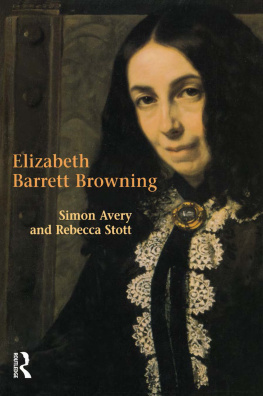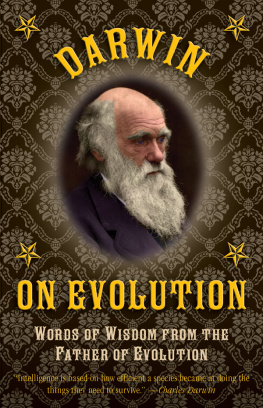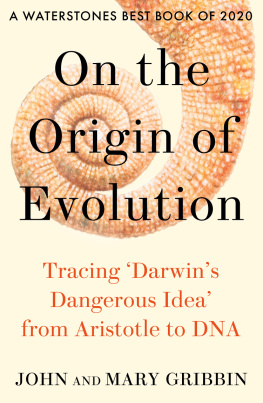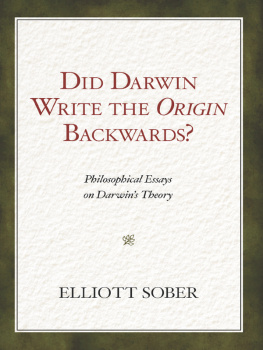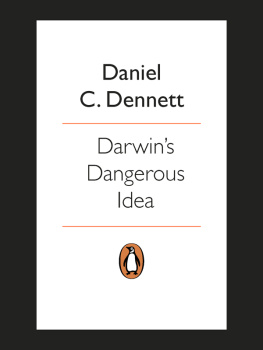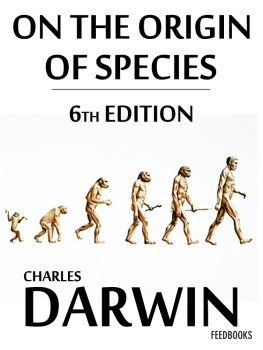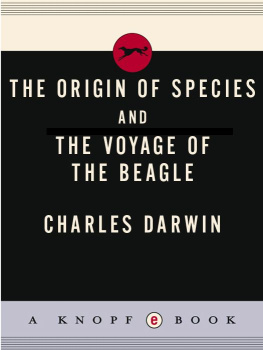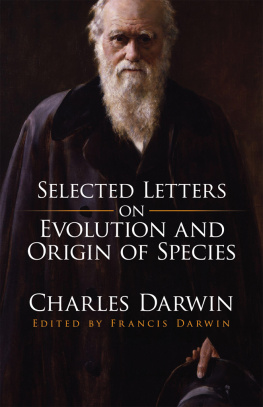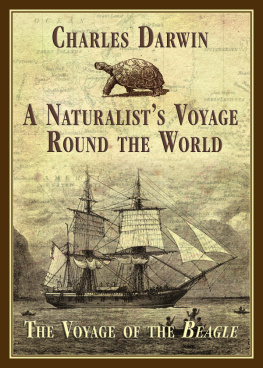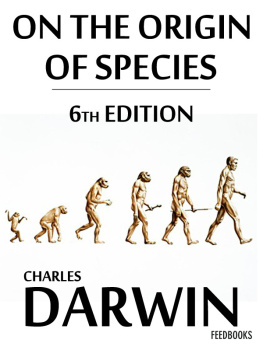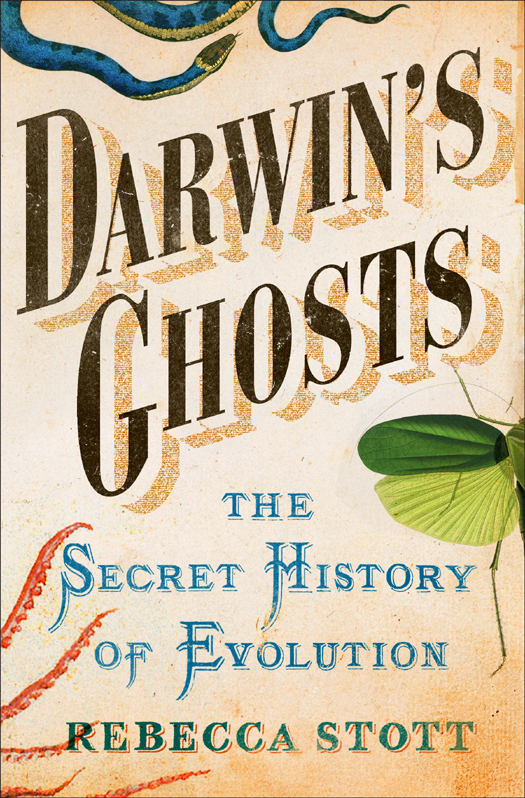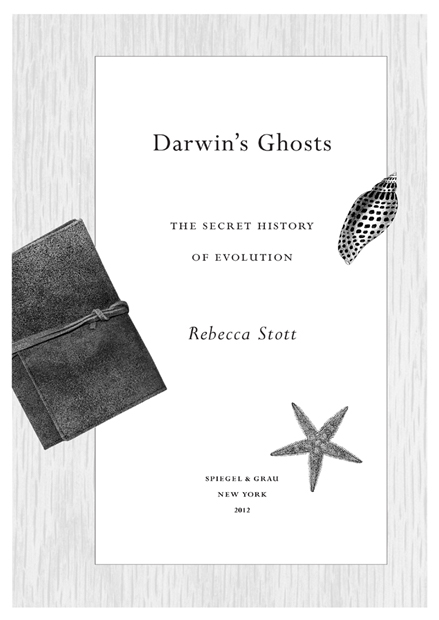
ALSO BY REBECCA STOTT
The Coral Thief
Ghostwalk

Copyright 2012 by Rebecca Stott
All rights reserved.
Published in the United States by Spiegel & Grau, an imprint of The Random House Publishing Group, a division of Random House, Inc., New York.
S PIEGEL & G RAU and Design is a registered trademark of Random House, Inc.
Originally published in hardcover in the United Kingdom by Bloomsbury Publishing Pic, London.
LIBRARY OF CONGRESS CATALOGING-IN-PUBLICATION DATA
Stott, Rebecca.
Darwins ghosts: the secret history of evolution/Rebecca Stott.
p. cm.
eISBN: 978-0-679-60413-6
1. Evolution (Biology)History. 2. Darwin, Charles, 18091882. On the origin of species. 3. Darwin, Charles, 18091882Sources. 4. ScientistsBiography. 5. NaturalistsBiography. I. Title.
QH361.S76 2012
576.82dc23 2011041951
www.spiegelandgrau.com
Title-page images: iStockphoto (journal; shell)
Jacket design: Tal Goretsky
Jacket images: PoodlesRock/Corbis (snake),
Science and Society/SuperStock (green insect),
akg-images (fish, cuttlefish)
v3.1
For Kate and Anna,
and for Dorinda
Once grant that species [of] one genus may pass into each other & whole fabric totters & falls.
Charles Darwin,
NOTEBOOK C
Masterpieces are not single solitary births; they are the outcome of many years of thinking in common, of thinking by the body of the people, so the experience of the mass is behind the single voice.
Virginia Woolf,
A ROOM OF ONES OWN
Preface
I grew up in a Creationist household. As a child, I often thought about Charles Darwin; I wondered who he was and whether he knew, as my grandfather and the other preachers alleged, that he had been sent to earth to do Satans work. It seemed an odd reason to make a man, I thought, but then, in the scale of things, perhaps no more odd than the story of God and Satan tormenting Job or the angels who appeared in Sodom and Gomorrah, no more strange than the pillar of salt that Lots wife was turned into, or the Four Horsemen of the Apocalypse. I also wondered if, as Satans man, Darwin might have hooves and scales. But generally it wasnt a good idea to ask questions about such things.
One hot summers day, when I was around the age of nine or ten, knowing that I could not ask about Darwin or his ideas without being reprimanded, I went looking for him in the pages of the family Encyclopaedia Britannica. The house was emptymy preacher father was away from home and my mother was out gathering my younger brothers and sisters for the evening prayer meetingbut I still felt fear as I eased out the volume marked D from the shelves. I knew I could be getting myself into serious trouble.
But the page where Darwin should have been was missing. Along the gap there was a perfectly straight stub: the page, my father told me much later, had been razored out by my grandfather sometime in the 1950s. When the encyclopedia volumes had arrived in their wooden crate, my grandfather had summoned the family to the sitting room in their Brighton house to admire them; during this ceremony he had picked up the D volume and taken a razor to the page, while delivering a sermon about the wickedness of Mr. Charles Darwin.
The missing page only made me more determined to find out what Darwin had really said. Because we had only a small collection of carefully selected books on the shelves of the family homeincluding several morality tales such as The Story of Mary Jones and Her BibleI had already discovered the transgressive pleasures of the school library. There, a few days later, I found another encyclopedia set, and in a stolen moment between lessons, I read as quickly as I could the definitions of evolution, animal-human kinship, and natural selection, convinced that at any moment I might be discovered and denounced. I struggled to understand the complex ideas on the page. I dared not ask questions, however, even of my teachers, for fear that news of my scientific interests might be revealed at a parent-teacher evening. Questions multiplied in my head. I began to daydream about half-animal, half-human forms, molten landscapes and prehistoric worlds.
When my parents later joined a moderate Anglican church and developed more permissive views, later still when my father had lost his faith and my mother had allowed us to work out our own beliefs for ourselves, when, as a teenager, I had the freedom to pursue my own intellectual curiosities unchecked, I continued to feel the simultaneous magnetism and frisson of danger when I wandered, as I often did, back to library shelves containing books on Darwin or evolution or genetics. I still feel it.
Certain curiosities, perhaps especially those that arise out of childhood prohibition and transgression, are not sated by a lifetimes reading and thinking. Evolution opened up a new way of seeing the world for me that was quite different from the one I had grown up with, but not necessarily any easier to understand or any less odd or extraordinary.
Years later, I wrote a book about the young Darwin. I came to admire him for his doggedness, for his rebelliousness, and for the range and brilliance of his imagination, as well as for the way he had stuck to his guns and kept on pursuing answers to his questions about the origin of species even though he knew he would be denounced as a heretic.
At the same time, I became preoccupied with the shadowy figures behind Darwin, his predecessors, the less well-known rebels who, I realized, had asked similar questions about the origin of species before him, in some cases a long time before him, and reached similar conclusions. What kinds of risks had they taken? What price had they paid for their curiosity? Why had understanding natures laws and the origins of species been so important to them that they had been prepared to challenge intellectual or religious orthodoxies and thus risk their reputations and sometimes even their freedom? I knew they must have been audacious as well as clever.
Priests and bishops denounced Darwins predecessors; police agents spied on them. They locked their ideas away for fear of bringing disgrace on their families. They deferred publishing. They searched out like-minded men and women and safe places to ask the questions about the origins of time and of species that pressed upon them. They went underground. All of them went on gathering evidence just the same, convinced that species were not fixed and that they had not all been created in seven days.
Many of Darwins predecessors were called infidels. The word has its origins in the fifteenth century and means, in its broadest sense, those who do not believe. By the eighteenth and nineteenth centuries, when religious leaders and university professors called Darwins predecessors infidels, they believed them to be as dangerous as the infidel soldiers of the Crusades; anyone who promoted a theory about the mutability of species, they declared, was an enemy of Christianity because such an idea contravened the sacred truth set out in the Bible. By the early nineteenth century it seemed there were so many infidels aroundmostly radicals who were promoting atheism as part of a reformist agendathat evangelicals wrote books with titles like


